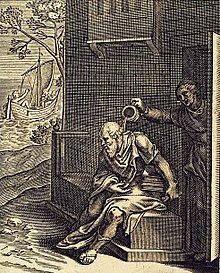
Iambus or iambic poetry was a genre of ancient Greek poetry that included but was not restricted to the iambic meter and whose origins modern scholars have traced to the cults of Demeter and Dionysus. The genre featured insulting and obscene language[1][2] and sometimes it is referred to as "blame poetry".[3] For Alexandrian editors, however, iambus signified any poetry of an informal kind that was intended to entertain, and it seems to have been performed on similar occasions as elegy even though lacking elegy's decorum.[4] The Archaic Greek poets Archilochus, Semonides and Hipponax were among the most famous of its early exponents. The Alexandrian poet Callimachus composed "iambic" poems against contemporary scholars, which were collected in an edition of about a thousand lines, of which fragments of thirteen poems survive.[5] He in turn influenced Roman poets such as Catullus, who composed satirical epigrams that popularized Hipponax's choliamb.[6] Horace's Epodes on the other hand were mainly imitations of Archilochus[7] and, as with the Greek poet, his invectives took the forms both of private revenge and denunciation of social offenders.[8][9]
- ^ Christopher Brown, in A Companion to the Greek Lyric Poets, D.E.Gerber (ed), Leiden 1997, pages 13–88
- ^ Douglas E. Gerber, Greek Iambic Poetry, Loeb Classical Library (1999), Introduction pages i–iv
- ^ D. Mankin, Horace: Epodes, C.U.P., 8
- ^ J. P. Barron and P. E. Easterling, "Elegy and Iambus" in The Cambridge History of Classical Literature: Greek Literature, P.Easterling and B. Knox (eds), Cambridge University Press (1985), page 120
- ^ A.W. Bulloch, "Hellenistic Poetry", in The Cambridge History of Classical Literature: Greek Literature, P.Easterling and B.Knox (eds), Cambridge University Press (1985), pages 556–57, 569
- ^ Peter Green, The Poems of Catullus, University of California Press (2005), pages 10, 33
- ^ E. Fraenkel, Horace, Sandpiper Books Ltd, 32
- ^ J.P. Clancy, The Odes and Epodes of Horace, Chicago (1960), page 196
- ^ V.G. Kiernan, Horace: Poetics and Politics, New York (1999), page 52